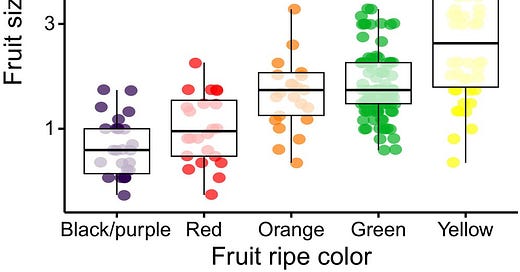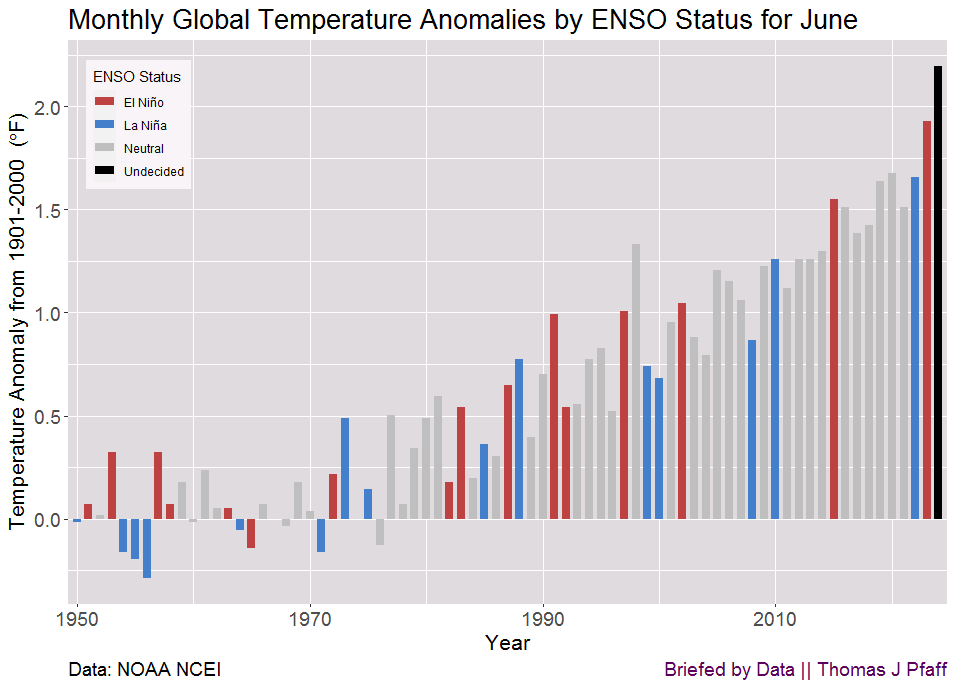Graph of the week
How many small yellow fruits can you name? Probably none. From the paper A highly resolved nuclear phylogeny uncovers strong phylogenetic conservatism and correlated evolution of fruit color and size in Solanum L (5/27/2024):
Caption:
Results of the phylogenetic generalized-least squares regression indicating a significant correlated evolution between fruit color and size across Solanum species. Letters at the top indicate groupings revealed by post hoc contrast analysis, where black/purple and red fruits are on average two times smaller than orange, green, and yellow fruits. Box shows the interquartile range with the solid line indicating the median, and whiskers the max and min values without outliers (calculated as 1.5 times the interquartile range).
Confidence in institutions
A Gallup article, U.S. Confidence in Institutions Mostly Flat, but Police Up (7/15/2024), has some interesting results. Here are two:
Confidence in the police is up a lot. This is a large one-year change and begs the question of why. Did the police do something so different to move these results? Or did the media stop railing on police, and so perceptions went back to what they were? Or maybe folks realized that life without police isn’t so great? Either way, this is something worth understanding.
The second image is a ranking of trust in institutions. In context, the police are doing great on the list, coming in third. Higher education is 4th, but I wouldn’t get too excited about that with only 36% responding with a great deal or quite a lot of confidence. An expensive product that, on some level, is voluntary is going to have problems with so little confidence. There are partisan divides, with 56% of Democrats responding a great deal or quite a lot, 35% for Independents, and 20% for Republicans, but the 56% for Team D isn’t exactly inspiring.
AI and higher education
An institution with low confidence is just waiting for disruption. Higher education should be concerned with start-ups such as Eureka Labs. Here is what they are reaching for (posted July 16, 2024):
How can we approach an ideal experience for learning something new? For example, in the case of physics one could imagine working through very high quality course materials together with Feynman, who is there to guide you every step of the way. Unfortunately, subject matter experts who are deeply passionate, great at teaching, infinitely patient and fluent in all of the world's languages are also very scarce and cannot personally tutor all 8 billion of us on demand.
However, with recent progress in generative AI, this learning experience feels tractable. The teacher still designs the course materials, but they are supported, leveraged and scaled with an AI Teaching Assistant who is optimized to help guide the students through them. This Teacher + AI symbiosis could run an entire curriculum of courses on a common platform. If we are successful, it will be easy for anyone to learn anything, expanding education in both reach (a large number of people learning something) and extent (any one person learning a large amount of subjects, beyond what may be possible today unassisted).
I used to think this was a minimal threat, as learning on a computer at home would miss out on the student experience of being away at college. But my anecdotal observations suggest this is less important. Students seem to spend considerably less time interacting with each other on campus and in the dorms. If this isn’t happening, then the experience of a residential college has much less value. Enter AI learning. Always patient, always excited, always there to help, and likely at a much lower cost.
What do you think?
How hot was June 2024?
Here is my monthly update of temperature anomalies. As you’ll see, June 2024 did set a record, but when you look at the all-months graph, the last black bar is no higher than some past neutral ENSO months. Here is what NOAA has to say about June 2024 (bold mine):
June 2024 was the warmest June on record for the globe in NOAA's 175-year record. The June global surface temperature was 1.22°C (2.20°F) above the 20th-century average of 15.5°C (59.9°F). This is 0.15°C (0.27°F) warmer than the previous June record set last year, and the 13th consecutive month of record-high global temperatures. This ties with May 2015-May 2016 for the longest record warm global temperature streak in the modern record (since 1980). June 2024 marked the 48th consecutive June with global temperatures, at least nominally, above the 20th-century average.
Global land-only June temperature also was warmest on record at 1.75°C (3.15°F) above average. The ocean-only temperature also ranked warmest on record for June at 0.98°C (1.76°F) above average, 0.05°C (0.09°F) warmer than the previous record warm June last year, and the 15th-consecutive monthly ocean record high. These record temperatures occurred under ENSO-neutral conditions. According to NOAA's Climate Prediction Center, ENSO-neutral conditions are present and La Niña is favored to develop during July-September (65% chance) and persist into the Northern Hemisphere winter 2024-25 (85% chance during November-January).
As we head into La Niña, we should expect anomalies to be around 2°F by following the blue bar trend in the all-month graph. Overall, we should expect that we won’t set anomaly records each month, but we will likely set La Niña anomalies records; the blue bars are increasing themselves.
From the gardens




Who gets to work from home?
This chart comes from the BLS (7/15/2024)
Workers with higher levels of education were more likely to work at home than were those who had less education. Among workers age 25 and over, 52 percent of employed people with a bachelor’s degree or higher performed some work at home on days they worked, compared with 22 percent of those with a high school diploma and no college.
I wonder how this plays out over time. Do those with less education resent those who get to spend so much time working from home? Does this just create more of a class divide? The more people work from home, it would seem, the less they interact with anyone different from them, increasing the class divide.
Electoral vote
If you like following the presidential horse race, then I’ll recommend electoral-vote.com. An image of the landing page is below. The map is interactive, with scroll-over information including the latest poll results for the state.
Data center news
From DCD (7/12/2024)
Data center capacity in the Pacific Northwest could reach 4,000MW in the next five years, pushing the region’s power grid to its limits, a new report has warned.
The report says that, in its high-end scenario, data center power consumption could reach an annual 4,000MW, five times that of the city of Seattle. “If data center load growth will be in the higher range of the forecast, the region will have insufficient resources to maintain adequacy,” the report said.
The spinning CD
Please share and like
Please help me find readers by forwarding this article to your friends (and even those who aren't your friends), sharing this post on social media, and clicking like. If you have any article ideas, feedback, or other views, please email me at briefedbydata@substack.com.
Thank you
In a crowded media market, it's hard to get people to read your work. I have a long way to go and I want to say thank you to everyone who has helped me find and attract subscribers.
Disagreeing and using comments
I'd rather know the truth and understand the world than always be right. I'm not writing to upset or antagonize anyone on purpose, though I guess that could happen. I welcome dissent and disagreement in the comments. We all should be forced to articulate our viewpoints and change our minds when we need to, but we should also know that we can respectfully disagree and move on. So, if you think something said is wrong or misrepresented, then please share your viewpoint in the comments











